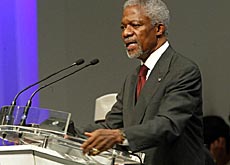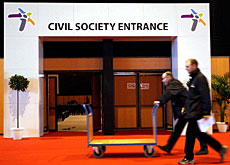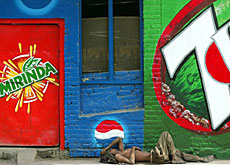Summit leaders put spotlight on human rights

The World Summit on the Information Society got underway in Geneva on Wednesday, with calls for improved universal access to the emerging information society.
Global leaders were also warned of the need to ensure respect for human rights and freedom of expression and opinion.
More than 50 heads of state or government and around 13,000 representatives of civil society, international organisations and the private sector are attending the three-day event.
Swiss President Pascal Couchepin officially opened the summit at a ceremony involving thousands of delegates on Wednesday.
“I’m overjoyed to welcome you to Switzerland for this summit,” Couchepin told the crowd.
“We are proud to host this summit, which, for the first time on an international level, will deal with the challenges of the information society.”
Global challenge
His comments were echoed by the UN secretary-general, Kofi Annan, who began his speech by thanking the Swiss for their “remarkable support” in helping to organise the summit.
“I’m not speaking just about their warmth and customary efficiency, but the political resolve they showed in making this summit a success,” said Annan.
He added that building an open and empowering information society was “a social, economic and ultimately, political challenge”.
“From trade to telemedicine, from education to environmental protection, we have in our hands, on our desktops and in the skies above, the ability to improve standards of living for millions upon millions of people,” said Annan.
Human rights
Annan’s challenge was taken up on Wednesday by government delegations who set about discussing the summit’s draft declaration of principles and plan of action.
In the run-up to the summit, Swiss negotiators had been busy behind the scenes, pushing delegates to agree on major sticking points in these draft texts, including the financing of information technology networks in poor countries, internet governance and human rights.
During last-minute talks that stretched into Tuesday, negotiators finally reached a compromise on all of their outstanding differences of opinion over the documents.
But some countries are reportedly still hoping to water down references to respect for press freedom and access to information, insisting that national legislation has priority over human values.
Confronting these moves, both Annan and Couchepin highlighted the importance of human rights in their speeches.
“The right to freedom of opinion and expression, defined in the Universal Declaration of Human Rights, is a fundamental part of the development of the information society,” said Couchepin.
“Indeed, the right to freedom of opinion and expression is fundamental to development, democracy and peace and must remain a touchstone for our work ahead,” Annan insisted.
Lopsided turnout
Dozens of world leaders, mostly from poor countries, are taking part in the Geneva talks, including the Zimbabwean president, Robert Mugabe, and the Nigerian president, Olusegun Obasanjo.
On the opening day of the summit, Mugabe lashed out at Western media and railed against new technologies on his first visit abroad since quitting the 54-country Commonwealth.
“Beneath the rhetoric of free press and transparency is the iniquity of hegemony,” he said. “The quest for an information society should not be at the expense of building a sovereign national society.”
Other leaders from developing nations at the summit are using the discussions to highlight the need for public-private partnerships and increased spending for information technology networks in poor countries.
Staying away
Meanwhile, many Western leaders were conspicuous in their absence.
The German chancellor, Gerhard Schroeder – one of the most prominent European leaders expected to come to Geneva – called off his trip at the last minute, citing pressing concerns at home.
The United States opted to send a low-level delegation to the summit, led by the State Department’s coordinator for international communications and information policy, David Gross.
The absence of high-ranking officials from rich nations, such as the US and Britain, has prompted some sceptics to question whether there is sufficient political backing for the summit’s objectives.
But Roberto Rivola, a spokesman for the summit’s Swiss secretariat, told swissinfo that the no-show by Western leaders did not signify a lack of enthusiasm on the part of their governments.
“We shouldn’t look simply at how many and which heads of state are here,” said Rivola. “Around 160 countries are represented at this summit and are expected to commit to its results on Friday, and that’s the real measure of its success.”
swissinfo, Anna Nelson at the WSIS in Geneva
More than 50 heads of state or government are participating in the WSIS.
The vast majority are from developing countries, mainly in Africa.
In addition, some 13,000 representatives of governments, civil society, international organisations and the private sector are attending the summit discussions and side events.
As the host country of the event, Switzerland has organised two major platforms focusing on the use of information and communication technologies for development and the role of the media in the information society.
The first phase of the World Summit on the Information Society (WSIS) kicked off in Geneva on Wednesday.
The second phase of the United Nations gathering, which aims to bridge the digital divide, will take place in Tunisia in 2005.
During Wednesday’s opening ceremony in Geneva, both the Swiss president, Pascal Couchepin, and the UN secretary- general, Kofi Annan, underscored the importance of human rights in the development of the information society.
They also challenged the summit participants to take the political initiative to provide equal and affordable access to information for all people of the world.

In compliance with the JTI standards
More: SWI swissinfo.ch certified by the Journalism Trust Initiative



You can find an overview of ongoing debates with our journalists here. Please join us!
If you want to start a conversation about a topic raised in this article or want to report factual errors, email us at english@swissinfo.ch.